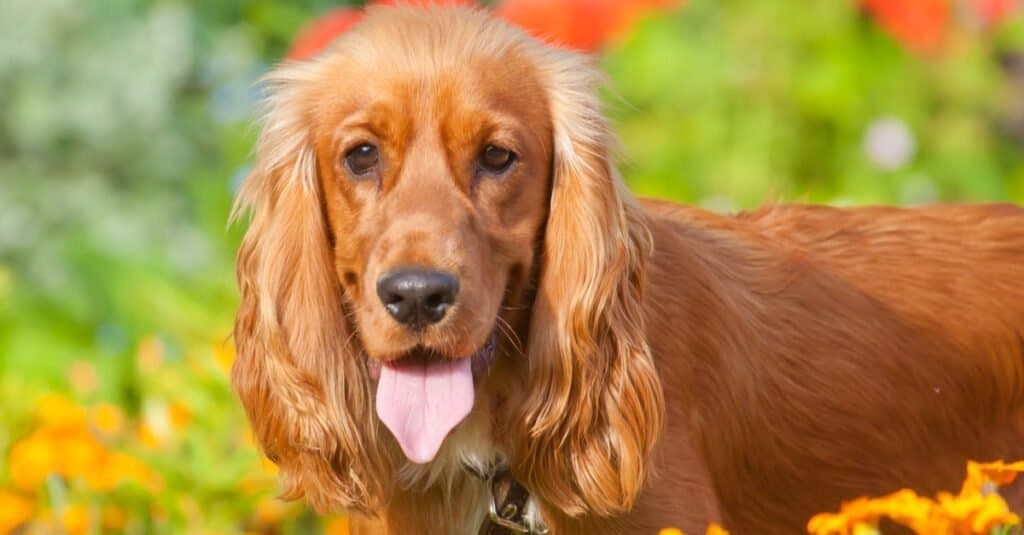The English cocker spaniel is recognized by the American Kennel Club as an entirely separate breed to the American cocker spaniel. The English breed has a less profuse coat, a longer head, and a less domed skull than its American cousins. These gorgeous dogs make devoted family pets but they are high-energy and need a lot of exercise. All you have to do is look at their endlessly wagging tail to see just how lively, and happy, they are. If you have just welcomed an English Cocker Spaniel pup into your home, it is reassuring to know that they are progressing as they should. So, here we share a cocker spaniel progression growth chart together with some training tips.
Breed Summary
English Cocker Spaniels are a popular breed in the AKC sporting group category. They are a medium-sized dog that can be a wide variety of colors and can be a block color or with marked, ticked or roaned patterning. Their coat is thick and requires regular grooming. These dogs are very busy and constantly happy with big brown eyes that will make your heart melt. Their origin is as a hunting dog – their job was to flush out woodcocks and this was how they got their name.
English Cocker Spaniel Growth and Weight Chart by Age
English Cocker Spaniel pups are born at different sizes and develop at different rates. This can be unpredictable although genetics and diet probably play a role. It is important that you keep a close eye on your puppy’s growth and development. Take them for regular weight checks with your vet – this also gives you the chance to raise any concerns. Here is a rough guide to English Cocker Spaniel weight by age.
| Age | Male Weight | Female Weight |
| Birth | 0.5-1lbs | 0.5 -0.9lbs |
| 1 Month | 4-5lbs | 3-4.5lbs |
| 6 Weeks | 6-9 lbs | 5-8lbs |
| 2 Months | 8-11 lbs | 7-10lbs |
| 3 Months | 12-14 lbs | 11-14lbs |
| 4 Months | 16-19 lbs | 15-18 lbs |
| 5 Months | 19-23 lbs | 18-22 lbs |
| 6 Months | 22-26 lbs | 20-25 lbs |
| 7 Months | 23-28 lbs | 22-28 lbs |
| 8 Months | 25-31 lbs | 24-29 lbs |
| 9 Months | 27-32 lbs | 25-31 lbs |
| 10 Months | 28-33 lbs | 25-32 lbs |
| 11 Months | 29-34 lbs | 26-32 lbs |
| 12 Months | 30-34 lbs | 26-33 lbs |
| 2 Years | 30–34 lbs | 26-33 lbs |
When Will My English Cocker Spaniel Stop Growing?
English cocker spaniels reach their full height quite early – sometimes as young as nine or 10 months. Most don’t grow a lot after 12 months of age but they may continue to fill out and gain weight after this – util about 14 months. However, this does not mean that their bones and muscles have finished developing. You therefore need to moderate their exercise until they are at least over 12 months of age. If pups have too much exercise it can cause joint problems in older age. Balance physical exercise with mental stimulation to keep your pup healthy and happy.
How Big Will My English Cocker Spaniel Be When It’s Fully Grown?
Not all English Cocker Spaniels are the same size! The American Kennel Club breed standard describes them as compactly built and balanced. Males should have a height to the withers of 16 or 17 inches whilst females are 15 to 16 inches. Male dogs should weigh between 28 and 34 pounds but females should be 26 to 32 pounds. Of course, your particular dog may fall outside these ideal dimensions.
When Should My English Cocker Spaniel Be Spayed or Neutered?
In general, the correct age to neuter or spay a dog depends on their breed, size, and gender. The decision is not an easy one and there are several factors to consider. You need to balance the health benefits of neutering/spaying at an earlier age with the potential health disadvantages. Most dogs are neutered or spayed between the ages of six months and two years. It is important to take appropriate advice from your vet.
When Should My English Cocker Spaniel Be House Broken?

You need to be patient when house breaking your spaniel.
©slastena/Shutterstock.com
Whilst most English cocker spaniel pups are easy to house train, some can take a little longer. The breed can be unpredictably defensive which means that they can react badly when they think they are under threat. It is vital that you never use harsh words towards your English Cocker Spaniel if they have an ‘accident’ inside. The other challenge is to get them to concentrate for long enough to do a poop or pee while outside because they will be so excited and will want to play. It may help if you lead them around your garden or yard on a leash to help them calm down for long enough to go potty.
When Should My English Cocker Spaniel Stop Eating Puppy Food?
English cocker spaniels generally do well on most high-quality dog foods suitable for medium-sized breeds. If your spaniel is going to be working as a gun dog, they may benefit from food with a higher protein content to support their increased activity. The breeder or a gun dog trainer can give you more specific advice on this.
Puppy foods are designed for optimum growth and development and you usually transition your dog to adult food before 12 or 18 months. However, all foods are different and you should follow the advice on the packet. If you are feeding your very young pup kibble, you will probably need to mix this with water to begin with. Once they are a few months old, most pups can cope as puppy kibble as it is smaller in size. Follow the feeding guide on the packet for quantities – most pups have their daily allowance split between two or three meals. If you are transitioning from one type of food to another, do this gradually as sudden changes in diet can cause stomach problems in dogs.
When Will My English Cocker Spaniel Start Losing Teeth?
This breed starts to lose their baby teeth at around three months and will have a full set of adult teeth by the time they are 8 months. Unfortunately, spaniels suffer from frequent dental problems so dental hygiene is very important. You should get your puppy used to having their teeth cleaned from a young age. Use a special dog toothbrush and toothpaste. The dental problems start with a build-up of tartar on the teeth which then develops into infections of the teeth, teeth roots, and gums. This can lead to a loss of teeth and even kidney, liver, heart, and joint problems. Dental disease can cut three years from a dog’s life.
When Should I Start Training My English Cocker Spaniel?
If your pup is going to be a working gun dog, this training starts at about five months but there is plenty that they can learn before then. As soon as you get your pup home at about 10 weeks you can start to teach them basic commands. These can include ‘sit’, ‘down’, and ‘stay’. You can also start to teach them to walk on a leash without pulling. Socialization with other dogs and with people is also important.
The key to successfully training your spaniel is engagement. If the pup is taking no notice of you, the training session is pointless. When the dog is young, keep the training sessions short but your energy and enthusiasm high. You must be the most interesting thing in the room or park as far as your dog is concerned. This breed is intelligent but strong-willed according to the UK cocker spaniel club so you need patience and consistency.
What Cues Should I Teach My English Cocker Spaniel First?
Most new puppy owners start with the cue for ‘sit’ as puppies get the hang of this fairly easily. However, as a spaniel owner, the recall command is also very important. This breed tends to go racing away from you when they are off lead, especially if they are in an environment where there are loads of scents. To keep them safe, they must have a rock-solid recall command so you may want to start working on this one fairly early. Some owners use a whistle cue rather than verbal because the sound carries further.
When Will My English Cocker Spaniel Calm Down?
They don’t. If you want a calm and placid dog then a spaniel is probably not the best choice for you because it simply is not in their DNA to be super chilled. Having said that, they do mature and your adult dog will not be a complete lunatic like your pup or adolescent. If you start trawling the online forums you will find plenty of different opinions. Most owners agree that there is a change in their behavior from about two years and that most dogs are ‘calmer’ by the time they reach four.
Common Health Issues Your English Cocker Spaniel Might Experience
According to research carried out in the UK during 2016 and 2017, these are the most common health issues that your English cocker spaniel may experience:
- Periodontal disease
- Ear canal inflammation
- Obesity
- Alan sac impaction
- Diarrhoea
- Aggression
Pictures of English Cocker Spaniel as Puppies

English cocker spaniel puppies need at least two meals a day.
©Switlana Sonyashna/Shutterstock.com
Pictures of English Cocker Spaniel at 6 Months

Cocker spaniel pups make adorable pets.
©New Africa/Shutterstock.com
Pictures of Fully Grown English Cocker Spaniels

The English Cocker Spaniel is a medium-sized dog breed with long ears and a happy disposition.
©TCreativeMedia/Shutterstock.com
The photo featured at the top of this post is © otsphoto/Shutterstock.com
Ready to discover the top 10 cutest dog breeds in the entire world?
How about the fastest dogs, the largest dogs and those that are -- quite frankly -- just the kindest dogs on the planet? Each day, AZ Animals sends out lists just like this to our thousands of email subscribers. And the best part? It's FREE. Join today by entering your email below.
Thank you for reading! Have some feedback for us? Contact the AZ Animals editorial team.







